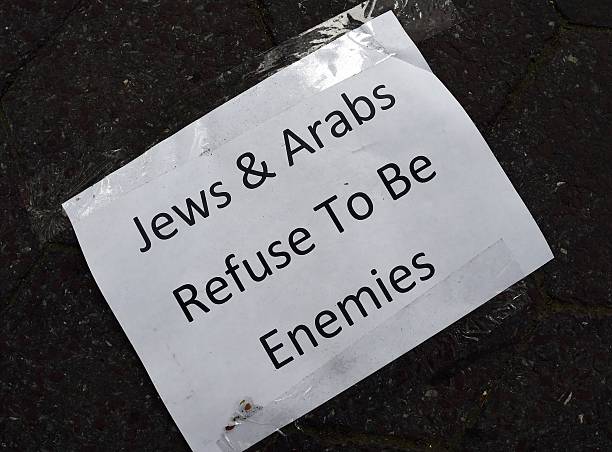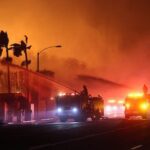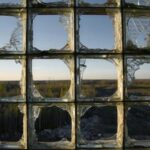A poster left by a participant taking part in a candlelight vigil and silent protest organized as part of the #JewsAndArabsRefuseToBeEnemies | August 11, 2014 near the United Nations in New York.
Photo credit: DON EMMERT/AFP via Getty Images
Late last week, I switched on my car radio to catch the US election results as they began to trickle in. What I heard crystallized my deepest fears, evidence of an America hardening into authoritarianism and mounting intolerance toward minorities.
Night had fallen in Israel and I was on the main highway, traveling home after a long day. Suddenly, in the opposite lane snaking up to Jerusalem, I saw a swarm of people blocking the road. Defense Minister Yoav Gallant had just been fired by Prime Minister Netanyahu; the changes of a hostage deal or an end to hostilities had once again dwindled. Police were closing in on the protesters and a long line of vehicles was already building up. On the Ayalon freeway and in other locations all over the country, protesters lit bonfires, blocking roads. In several places, police used skunk water cannons to disperse the crowd. Arrests were made.
In a world increasingly divided into absolute positions, the protests erupting across Israel that night were a stark reminder of my own brush with intolerance back in March, when my essay, “From the Edges of a Broken World,” was attacked by the very journal that had shepherded the essay and then published it. It felt like war had been declared on me for daring to step out of the lines, for not sticking to familiar scripts. I wrote about empathy, its limits and challenges during conflict, an essay of personal activism that examined what an individual, struggling to retain a sense of humanity, might do in a state of war.
I learned a lot back then. I learned that people do not listen to anything much that doesn’t sound like their own voices. I learned that words, however carefully composed, can be twisted out of all proportion. I learned that there is no room in the world today, beginning with the literary world, for nuance. You are either for or against. You’re either on the right or the left, and God forbid you articulate an effort to understand, let alone empathize.
Israelis criticized me for helping Palestinians through the work I do with Road to Recovery, taking children from the West Bank to hospitals in Israel. Some of the Israelis believe I am saving children who will grow up to become terrorists. Pro-Palestinians criticized me for being a colonialist, a settler, a mother to murderous children.
But this wasn’t about me.
In 2021, Sally Rooney refused to have her third book translated into Hebrew by an Israeli publishing house that “does not publicly distance itself from apartheid and support the UN-stipulated rights of the Palestinian people.” Many Israelis scoffed at this: Who wants to read Rooney anyway? But I did. I was curious to know what she thinks, how she writes, what makes her tick. I didn’t automatically cross her off my reading list. I read one book and then another. Recently I listened to Rooney reading a short story on The New Yorker podcast—I wanted to hear her reading in her own voice. As a literary translator, I always ask my poets to read to me from their work because I believe the voice is in many ways a mirror of the soul. Does the writer read slowly, does she linger over certain words, is her reading measured? I listened to Rooney while driving in my car. I came away from her reading feeling puzzled as to why a sense of nuance in her voice and writing does not extend to a sense of nuance in regard to others.
I say this because now she is spearheading a petition to boycott Israeli cultural institutions and publishers “who are complicit or have remained silent observers of the overwhelming oppression of Palestinians.” Sally Rooney is not alone: more than a thousand writers have signed. I didn’t sign, although I oppose the Israeli government’s utter disregard for the Palestinian population, and do not consider myself a silent observer.
In their eyes, I am complicit simply because I live in Israel. The fact that I am doing all I can to protest the government, to help other people, Palestinians and Israelis, and to make my voice heard is ignored by them. Frankly, leaving would be much easier. I could sit back and watch from afar, but I’m going to stay here and do my best to make this world a little better.
Another petition closely followed on the heels of the first one, spearheaded by Creative Community for Peace, which supports Israel as “the only democracy in the Middle East “which allows all of its citizens—regardless of ethnicity, gender, or religion—the opportunity to participate in the running of the government.” I’m not signing this either, because this statement is oversimplified and does not acknowledge other opinions and narratives. It ignores the Arabs living in the West Bank under direct Israeli control, who are subject to constant oppression and discrimination. It ignores the destruction in Gaza and the killing of thousands.
I learned the importance of acknowledging the narrative of the other at a seminar offered by The Parents’ Circle-Families Forum, an organization of bereaved families, Palestinian and Israeli, who have lost loved ones to the conflict. The suffering of each mother, father, sibling or grandparent is enormous, unique and personal; it exists side by side with the suffering of others; it doesn’t ignore it.
One way to learn about the other side, or sides, is by dipping into books. Literature is about discovering and interacting, a bridge on which we may meet. I recommend reading “Ceasefire Haiku,” a poem by Faisal Mohyuddin. I also recommend reading Etgar Keret’s “Dear Mum,” or Joshua Cohen’s short story, “My Camp.” I read because I’m curious—and isn’t that one of the highlights of good literature, particularly literature in translation, which opens a window to other worlds and other perspectives?
In Olga Tokarczuk’s latest book, The Empusium, (translated by Antonia Lloyd Jones) Dr. Semperweiss tells his patient this:
The mind establishes for itself a set of acute opposites—black and white, day and night, up and down, man and woman—and they determine our entire perception. There’s nothing in the middle. Seen like that, the world is far simpler, it’s easy to navigate between these poles, it’s easy to establish rules of conduct, and it’s particularly easy to judge others . . .
In light of the results of the presidential elections in the US and the polarized opinions on Israel and Palestinian, these words particularly resonate.
They resonate for another reason. Yesterday, I passed by a restaurant in a quiet street near Jaffa Port. A big poster at the entrance declared in Arabic, Hebrew, and English the following: Jews and Arabs Refuse to be Enemies. The restaurant was almost empty; it was late in the day. Earlier, we took our grandchild on a half-hour boat trip around the port. We felt lucky to be able to do this, and I’m sure the other passengers on our modest voyage felt the same. The boat was full: there was an Arab family with a beautiful little boy with Down Syndrome, a young Jewish couple, another Arab couple, and us. Music in Arabic and Hebrew blared out from the loudspeakers as the anchor was raised and we pulled away from the pier. No one seemed to mind sharing: We all just wanted to spend a little time with our families, bobbing up and down on the choppy waves, watching seagulls swooping low, froth from the surge glinting in the late afternoon sun.
Joanna Chen
Joanna Chen is a literary translator and essayist. She is a member of Road to Recovery, an organization that drives Palestinian children to hospitals in Israel for life-saving treatment. She is also a member of The Palestinian-Israeli Parents Circle Forum.









Thank you Joanna for your always nuanced, beautifully written, and thought provoking comments.
a lovely essay Joanna, I am glad that your Broken World essay of last year, which I strongly identify with, did not break you, but as you show here, has only made you stronger
Joanna,
You are an inspiration to all decent people and I love you! Elana
Well done
Thank you so much, Joanna. Yours is an important voice, sadly almost never heard here in Israel.
Superb!